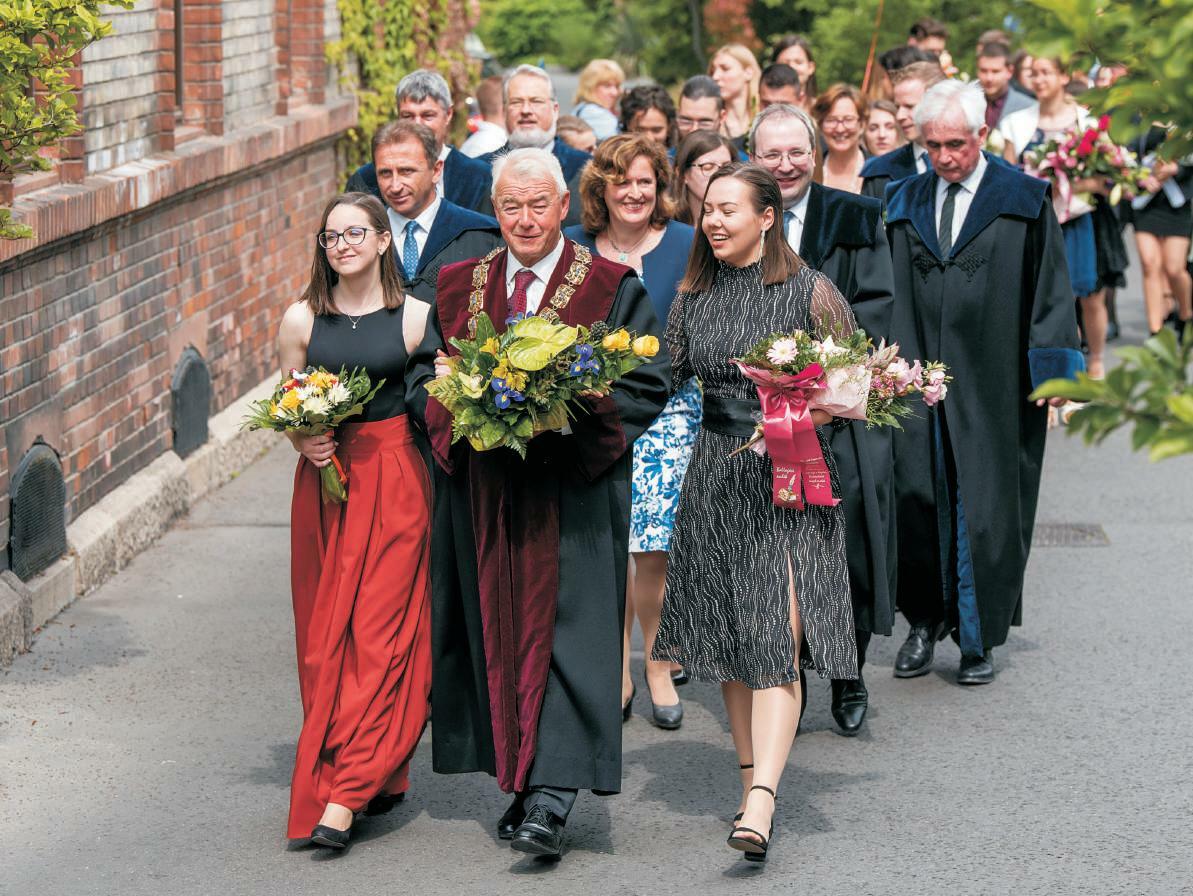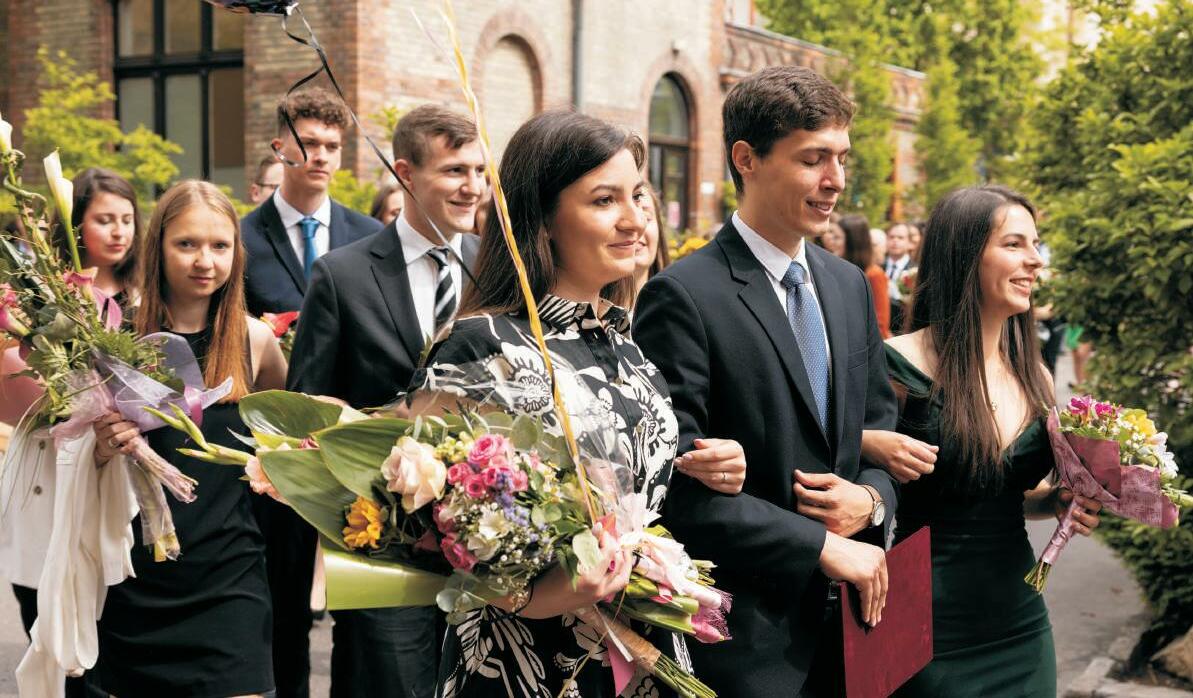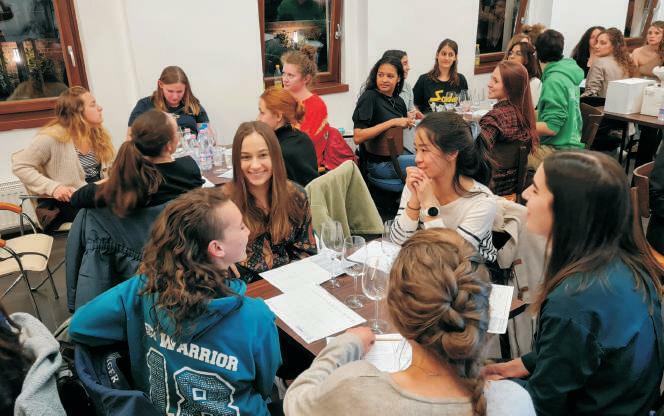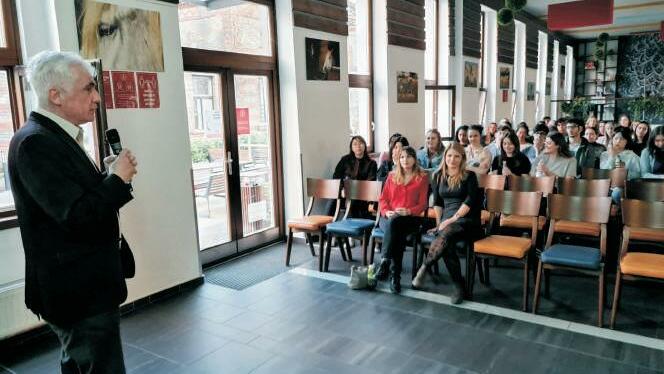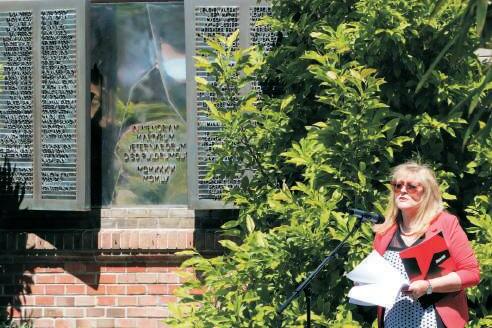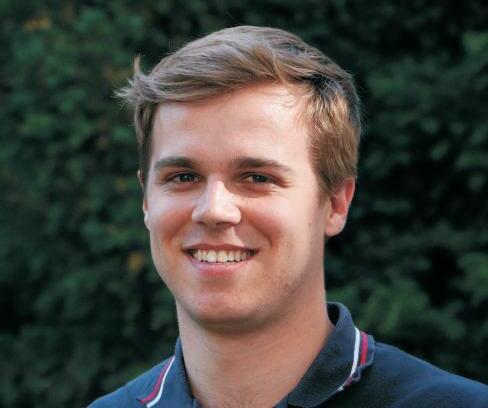
27 minute read
was held at our university
due to the increasing quality of professional care and services as well as the significant investments conducted in the previous year. Procured in 2020, our CT and MRI instruments now allow us to examine limbs in a standing position all the way to the tarsus and/or the hock. Within the first year, the clinic carried out 140 and 120 standing CT and MRI examinations, respectively. This could never have been possible without bringing our outstanding colleague, Associate Professor Annamária Nagy home from England. She is specialized in the examination of orthopaedic horse patients and the related imaging diagnostics. Among other things, MRI today allows us to identify injuries to the vital anatomic parts of the hoof, for example, the short section of the deep digital flexor. As a result, treatment can be much more precisely targeted, too. – Not always well. I find it especially hard to tolerate if I feel someone was neglectful and failed to complete a
– How can you handle the stress that comes with your job? task, which may cause harm to horses. As I grow older however, I seem to realize more and more that a kind word can often be more effective than any reprimand. If I can, I try to solve problems in a more peaceful way than I used to. As far as I'm concerned, horse riding is still the best stress relief. I love reading, too. All in all, I think family is the most important thing as it gives you the security you need and helps you in whatever problems you're going through.
Advertisement
– My father will be 90 this year, my mother is 87. Together with my siblings, the 36 grandchildren and the 36 greatgrandchildren, the “immediate” Bodó family has over 100 members. My wife and I have always thought having a big family is a great thing. We're both very happy to be the parents of our four beautiful children. My wife is a criminal lawyer. Her complex job involves a lot of responsibility, but she takes care of the daily tasks and motherly duties that come with our four children, and I will be eternally
– The Bodó family is legendary for being so extended as it is... grateful to her for that. Without her support, I wouldn't be where I am today. We moved to Pestlõrinc in 2001 so that we could live close to both the Clinic and the Court. Twenty minutes is still a safe distance even when you have to hurry to the surgery. Finally, let me share with you a few things that have been motivating, driving and inspiring me ever since my childhood. I have been involved with the Regnum Marianum community since the age of five. As an adult, I organized weekly gatherings and week-long nomadic camps up until the early 2000s. Today, our children are members and leaders of these small communities, which were forbidden and persecuted under the “cursed” Communist regime. In the last 20 years, my wife and I became members of the Families in Jesus Community as chief organizers or participants of many events. For example, we have been involved in preparing engaged couples for marriage. I believe these things can be the fundamental pillars of a Christian Hungary.
Interview with graduate student János Kiss "I always spent time where I could learn foreign languages, too"
Communities can be successful even if their representatives don't always win. University graduate János Kiss can consider his performance at this year's Equus Days as a success. Although he didn't win the Bos Major election, the students of his year group were always the most active participants in each event. He also told us how he had been using every opportunity to improve his language skills while having equine medicine on his mind all the time. As a result, h e g a i n e d a n u n f o r g e t t ab l e experience as a volunteer for night duty veterinary service. Here's an extract from our interview with him. GUSZTÁV BALÁZS – You were born in Keszthely, but you've spent much more of your life in the distant town of Nyíradony. What was the connection between the two places?
– When did you sit on a horse first?
– Horses. My father used to breed horses at the western end of Lake Balaton and at the edge of the Nyírség region for quite a long time. Later on the horses were sold one after the other. We don't have any now, but I've always thought I wanted to work with these wonderful animals when I grow up.
– Back when you don't even have memories. I can prove it with a photo where my sister and I are sitting on a horse. I was four when my father started to teach me horse riding. I even competed in show jumping.
– Yes. I didn't even consider applying to any other school, even though I went to an English-German special programme in high school, instead of biology and chemistry. Of course, I did take the advanced level exam in these two subjects, too. I thought if I don't get admitted, I would go to Germany to ride horses and reapply next year.
– I am a Student Council member, I'm in charge of international relations. I
– Were you admitted to the university on your first try?
– Are you actively involved in organizing the university's social life?
do my best to cooperate with our foreign fellow students and their representatives. I do all kinds of things, I translate and interpret for them if necessary.
– If there's a bigger event, we certainly need to contact each other. I've been promoting close relations with them ever since I started working in the Student Council. In my experience, they are very happy when it works out and they can feel they belong to the same community, the alma mater, just like us. International students, perhaps partly because of their situation, tend to be more open. Sometimes the necessary activity is missing on our side.
– I play in the international volleyball team. Only two of the 24 members are Hungarian. We were resourceful enough to find the opportunity to practice even during the pandemic.
– Last September I spent a month at the clinic of the University of Veterinary Medicine Vienna. That was my summer practice. I worked in the small animal clinic for three weeks. I was assigned to anaesthesiology, but I was also able to arrange for some time with the horses. There were lots of vets at the clinic. They came from all over the world. I thought German would be the only language spoken there, but I hardly heard any German in fact, because 80% of the vets came from abroad, and some of them didn't even speak German at all.
– I have the advanced level certificate in English, but I only have the i n t e r m e d i a t e i n G e r m a n , unfortunately. I've been putting off the advanced exam for years, but maybe I can get to it now. It is a fact that I actively look for the opportunity to speak a foreign language. When I became a teaching assistant at the Anatomy department, I made no
– How much do they need your help?
– Do you have foreign friends?
– Did you get to study abroad during your five years?
– You, on the other hand, speak excellent English and German, I'm told by various sources. I'm sure they think so because you actively use your language skills. – Equine health. More specifically, lameness and the u s e o f i m agi n g diagnostics.
– I see several options, but none of t h e m w i t h o u t horses. I used to consider working as a h o u s e c a l l veterinarian, but n o w I i m a gi n e myself doing my job at a clinic. I'd be happy to work as an associate of the university, too. I think I can get closer to that goal by p a r t i c i p a t i n g i n t h e o n e - ye a r rotational internship programme where newly-graduated vets work for a salary in monthly or bimonthly rotations in different units of the clinic, such as internal medicine, surgery and imaging diagnostics. I definitely want to gain practical experience abroad as well.
– I very much do! I've visited my sister and my friends in Italy many times. Interestingly enough, the best part of travelling for me is the journey itself. I love getting from one place to another. Sometimes getting there is better than being at your destination. Perhaps because I love flying. I have two dream destinations: Iceland and South Africa. I was invited to the southern tip of the exotic continent during the International Day.
Yes, a guy I play volleyball with. I asked him if they brought any alcoholic beverage with them. He said they couldn't unfortunately, because you can't really bring anything like that by air. He suggested to visit South Africa so they could treat me to some!
secret about it that I wanted to improve my German skills. I spent most of the two years in German practical classes, helping the students there. I always spent time where I could learn foreign languages, too. My next goal is to develop my French to a working level. – What was your most memorable experience during your clinical studies? – I've been working as a regular volunteer for duty veterinary service in Üllõ for about three months. Thanks to the good relations I developed with the professionals there, I was allowed to do much more things than a student's tasks: I was trusted to do the daily monitoring of horses and taking their vitals. You have to monitor the patient's condition and if it changes for the worse, you must alert the vets. This way the horses are constantly monitored. I will always remember my first night on the veterinary emergency room, I can't even get it out of my head. The colic surgery of a famous Hungarian sport horse and stud began at 1 a.m. I stayed with him at the postop stall until he got to his feet at 6 in the morning! Last summer a camel mare and her foal with a broken leg were brought in from a circus after midnight. That was an exciting case, too! – Which area of veterinary medicine are you the most interested in at the moment? – How do you e n v i s i o n y o u r f u t u r e i n t h e profession?
"My next goal is to develop my French to a working level" – Your friends tell me you love travelling, too! – By a student?
Career Day in the Student Center
23rd of March 2022
Our University organizes a lot of different events for its Hungarian and i n t e r n a t i o n a l s t u d e n t s t o g i v e information about the job possibilities after graduation. Such event is the „Job fair” which takes place each year in February. During the job fair several national and international veterinary employers, private veterinarians and clinics offer the chance for students to meet and talk to help them decide on their later jobs from the variety of possibilities.
MÍRA MÁNDOKI There is another event, called the Career Day organized mainly for students in the international study program, but also open for Hungarian students during an afternoon session every year in March. This event is getting more and more popular among students and our alumni as well. Social media is a great unofficial tool to track the graduated students' career. I keep contact with former students on social media and get some professional questions about cases as well. They also mention how they miss the university life, the atmosphere of our campus and the unforgettable times as students. Why don't we use this opportunity? Why don't we offer the possibility for them to come back and talk about their life? This is how the idea of the Career Day was formed by me and the first Career Day took place in 2018. We invited 4-5 former students who finished in different years, came from different countries and work in different field of veterinary profession to share their thoughts about life and career. They could explain why they chose their field, what difficulties they faced, how did they find proper jobs for themselves, what could they use from their education and what advice would they give to our undergraduate students. The idea was welcomed by several c o l le ag u es, t h e v i c e r e c to r f o r international affairs, Professor Tibor , the head of the Students'Bartha Office, and his staff helped a lot to organize a successful event. On the first Career Day in 2018, we invited , equine specialist from Switzerland who also works as chiropractic, uses acupuncture and other special methods as well; (UK), horse and farm a n i m a l s p e c i a l i s t ; (Germany), who works in their family praxis; the French from the research field and ( Ir e l a n d ) , a f r e s h l y gr a d u a t e d veterinarian.
In 2019, (Hungary) talked about her experiences in small animal praxis. After graduation she started to work in a small Hungarian rural clinic and changed it soon to a busy small animal praxis in the UK. She was the first in Hungary to own an accredited cat friendly clinic and nowadays she is one of the bests in small animal dentistry. Amelia Stevens, who graduated in 2016, visited us again and explained why she changed from small animal praxis to equine and dairy cattle medicine. Our next speaker, (Hungary) chose teaching and research over clinical work. In that year Dani was still a PhD student at the Department of Food hygiene and introduced the students to the magical field of research. The fourth
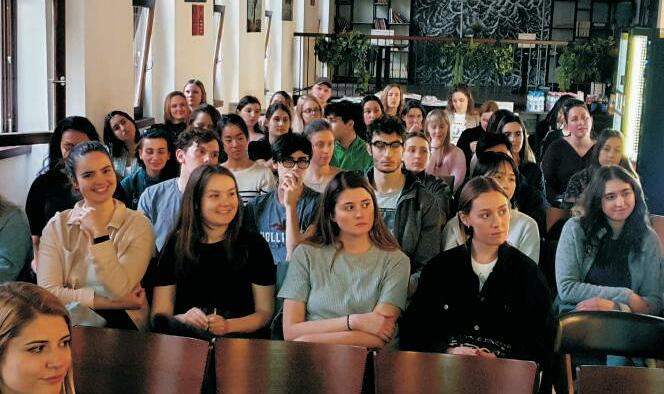
Péter Lessi Martina Neidhart Amelia Stevens B e r o G e h l Cecilé Yvon Evelyn Coleman speaker of the day was Mark Hedberg (Hungarian-American), who after graduation worked for 3 years in Saudi Arabia, several years in the UK, opened his own private praxis, but from 2018 w o r k e d a s s a l e s p e r s o n i n a biotechnology firm. As you can see, we could cover a wide range of veterinary work in the first two events, but there are always new ideas and new applicants. The Career day takes usually place in one of the biggest lecture halls to accommodate the large amount of interested students. Unfortunately, the Career Day was cancelled in 2020 and 2021 due to lockdown and the restrictions. So, we enthusiastically started the organization of this year's program. As all the lecture halls were booked, we changed the location to the Students' Center where 70 people can fit. All the seats were taken quickly which might be because of the wine tasting we organized afterwards. This year Prof. Bartha Tibor, the vice rector for international affairs opened the Career Day. He emphasized the importance of such event and greeted the alumni who were happy to come
Tretter Olga
Pleva Dániel
Career Day after Covid-19
back for a day. I chaired the evening, introduced all the guests, and moderated the Q&A sessions. Firstly, (Germany) spoke Alix Wieland about her own small animal clinic, which is led by her from 2017, right after her graduation. She showed her clinic virtually, talked about the case numbers, the ratio of patient species and the important equipment. She highlighted the importance of the friendships bound during university years. She explained about a network of the German graduates who finished at this university and how they maintain a “hot line” for difficult cases where they help each other. They support each other also that way that the farm animal vets treat the sick horse, swine, and cattle in her neighborhood, but send the small animal cases to her clinic from their clientage. This way they offer fast and professional service to all species, not only belonging to their expertise. The second speaker of the evening was (France) who had an a d v e n t u r o u s l i f e already during her university years. She s t u d i e d i n a n international school in Paris, then she did a neurobiology degree in Canada. After these s h e c a m e t o o u r university in Budapest because she wanted to be somewhere where she would be in an international setting. Throughout her studies she travelled to intern in India with snow leopards and red pandas, and in Australia and Thailand in zoos and wildlife rehabilitation centers. Catherine then went for a rotating internship in surgery and exotics in Italy and worked for a year in an exotics and small animal hospital in the UK. She left to volunteer as a wildlife vet in South Africa and s t a r t e d p r o d u c i n g w i l d l i f e documentaries. She travels a lot till now because she works mainly but not exclusively with large cats. She explained in detail how the students can find good placements for their practicals or 11 semester, how they can
C a t h e r i n e H a u w
th contact zoos, national or international safari parks. She also talked about the American NAVLE exam and how the students can prepare in the best way for it. She accented the tricks of the decision making in general (such as, list the pros and cons, have selfrecognition, know what you expect from the future job and/or workplace). She also drew the attention of the students to the large number of veterinary jobs o f f e r e d a n d t o m i n i m i z e t h e compromise when choosing their job. Juhász Thomas was the third guest. He is half Hungarian - half American, so h e s p e a k s Hu n ga r i a n. T ho m a s graduated in 2021, but he already had and MSc degree in in Environmental Sciences and policy. He is now a Marie Curie PhD student in zoology. He considers himself aquatic veterinarian. He is a member of World Aquatic Ve t e r i n a r y Me d i c a l A s s o c i a t i o n (WAVMA). He has 10 years of experience as an endangered species biologist. He is a veterinarian and researching student with lumpfish, sea urchin, European black sea cucumber, and wrasse species in Bantry, Ireland. He highlighted the endless possibilities of health management of fish and other aquatic species used for food. The last speaker was , veterinarian and a mother of two kids. She studied zoology at the University Guelph, Canada. She graduated in Budapest in 2013. She finished her Canadian equivalency exams in 2016. Her PhD defence was in 2020. Viki works at the Budapest Zoo,
Sós-Koroknai Viktória and she is a member of the European Association of Zoo and Wildlife Veterinarians from 2012. She is the vet of the Budakeszi Vadaspark (Budakeszi wildlife park).
Th e s t u d e n t s we r e ve r y mu ch interested in the different CVs of our guests, they asked a lot of questions not only after each lecture but also during the wine tasting. Besides the tricky blind tasting smart games were organized by the invited company. The success of the event was obvious as we could barely finish the discussion reaching the closing time. All the feedback were pretty good from the students and from the invited guest as well. Students during their studies see problems at the university, feel sometimes left out or experience unfairness. Some even vent these. Based on the stories of our alumni it turns out that such problems occur everywhere in life, they face even m o r e s e v e r e p r o ble m s a f t e r graduation. During the Career Day we can all see on the passionate faces o f o u r f o r m e r students that the p r o b l e m s f a d e away and they keep the good memories only. As s t u d e n t s t h e y m i g h t s u f f e r e d f r o m e a r l y m o r n i n g midterms, but by now they are aware of the unpleasant schedule of a veterinarian…
We started to organize next year's Career Day as we have already have 5 applicants for the event who want to share their story with the students and try to find an excuse to visit the campus again. The Career Day will be held on 22 of March 2023 with the traditional wine tasting. I do not want to let out too much information, but our guests will come from different fields such as state veterinarian, ICU, and exotic specialist. Looking forward to it!
nd
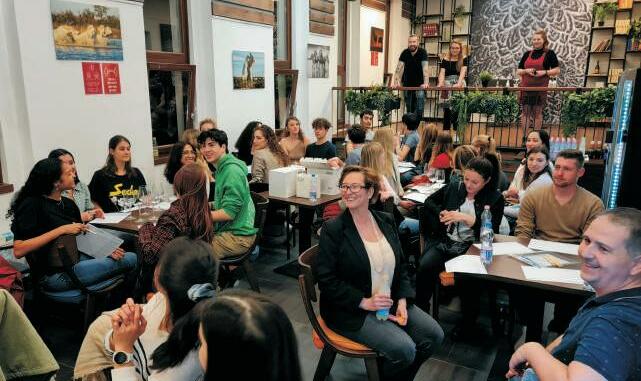
The 25th Graz conference was held at our university (UVMB)
The Graz conference on human and veterinary medical education is known from 1995, with the aim to improve and modernize the medical teaching for both human and veterinary doctors. The conference has a theme each year. Last year, although it was online, the teaching of life skills was discussed with speakers from all over the world. This April the use of the artificial i n t e l l i g e n c e ( A I ) , t h e d i g i t a l t e c h n o l o g i e s ( D T ) a n d t h e virtual/augmented reality (VR/AR) was in focus. This topic is cutting edge and highly trending in veterinary and medical education. The invited speakers were either veterinary or medical educators. MÍRA MÁNDOKI, ISTVÁN TÓTH On Thursday, 21 of April, after the st opening words of , Prof. Tibor Bartha vice-rector of the university, two keynote lectures followed by Andrew Maccabe (USA) and (Belgium). Dr. Pierre Lekeux Andrew T. Maccabe, the Chief Executive Officer of the American Association of Veterinary Medical Colleges (AAVMC) summarized the future of the veterinary education; talking about telemedicine, robotics, personalized learning and highlighted the positive effect of periodic accreditation process of medical establishments. Prof. Lekeux, the director of European System of Evaluation of Veterinary Training (ESEVT/EAEVE) emphasized the effect of digital technologies (DT) and artificial intelligence (AI) on veterinary training. He divided his speech about modern technologies into two main points: improvement of veterinary teaching by introducing DT/AI, on the other hand he underlined the importance of preparation of the students to the use of DT/AI in their everyday routine. The next session contained short lectures about the use of AI/DT/VR/AR. Gyula Balka, associate professor (UVMB, Pathology) summarized the possibilities of the 3DHistech slide s c a n n e r i n t e a ch i n g, r e s e a r ch, consultation, and diagnostic work. Lilla Prof. János Kollár, clinical and mental health psychologist
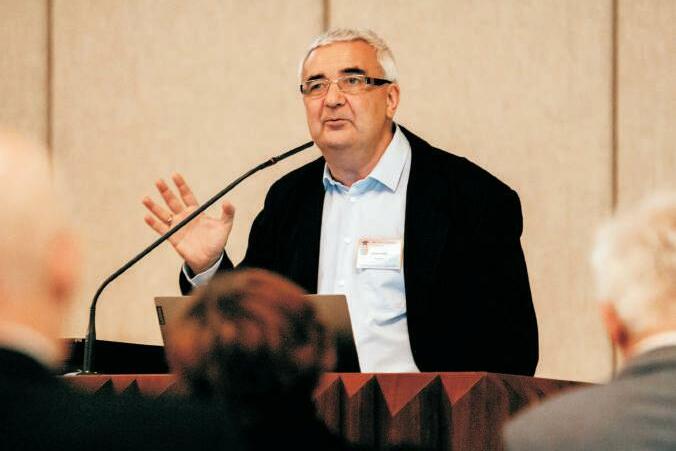
D é n es, r es e a r ch fe l low ( U V M B, Pathology) showed the function and operation of the Swinostics, which is a portable diagnostic tool in swine heard management developed in the frame of a European Union project. Szabolcs B u d a h á z y, m a n age r ( A RWo r k s ) explained the possible use of VR/AR in medical teaching and his firm allowed us to try these oculus tools during an onsite demo. Prof. János Kollár After lunch, , clinical and mental health psychologist (SU, Institute of Behavioural Sciences) explained his study about using immersive virtual reality (VR) for changing the attitude of medical students in a positive way towards people living with dementia. The next session was about 3D anatomy. Taimur Alavi (founder of „ivalalearn.com”) d e s c r i b e d t h e u s e o f d i gi t a l r e c o n s t r u c t i o n a n d e d u c a t i o n a l technologies to improve access to and the quality of supplemental anatomical teaching materials. He talked about the different methods, software, and approaches generating the 3D training. C z e i b e r t K á l m á n, v e t e r i n a r i a n (LimesVet Ltd.) demonstrated the role of 3D modelling in veterinary teaching and clinical reconstruction procedures with spectacular illustrations. During coffee break the participants could look at the posters to be presented later in the evening on a TV screen and watch s l i d e s h o w s f r o m p r e v i o u s Gr a z conferences. For the upcoming lecture we walked to the Zimmermann lecture hall of the Anatomy department, where , senior lecturerLászló Zoltán Reinitz (UVMB, Department of Anatomy and Histology) held a live demonstration with the 3D projector of the Anatomy. All participants, medical and veterinary educators enjoyed the experience of using 3D glasses to better understand the anatomical structures. After this lecture we invited our Hungarian and international guests to visit the magnificent campus of the university. , senior lecturer Anna Szilasi ( U V M B, P a t h o lo g y ) g u i d e d t h e participants interested through the buildings, along the park and to the small animal clinic while talking about the past, present and future of our university. From 6 pm, under the motto „In VIN veritas” a “posterparty” combined with a wine tasting started that was sponsored by the Veterinary Information Network (VIN). The authors of the posters introduced their research with a glass of wine in their hands standing in front of
their digital posters. The atmosphere of the event was very nice, and all the participants noted the outstanding way of presenting posters. During first session on Friday morning (Canada), Renate Weller Sarah Baillie (UK), (Austria) and Evelyn Steinberg Lucy Murray (UK) presented their lectures online, as due to different reasons (distance, overlapping program or even Covid positivity) they could not be with us in person. Renate Weller (the dean of the Faculty of Veterinary Medicine at the Calgary University) highlighted the advantage of using lowcost digital solutions in veterinary education besides the expensive digital tools. Sarah Baillie (Professor emeritus at the Bristol Veterinary University) explained the strengths of the flipped classroom approach based on the behavioral changes due to the pandemics. She emphasized the importance of balance between blending, innovation, pedagogy and evidence. Evelyn Steinberg, psychologist (researcher at Vetmeduni Vienna) talked about self-regulated learning in t e c h n o l o g y e n h a n c e d m e d i c a l education. This lecture raised the interest of the participants and Evelyn got a lot of questions after her talk. Lucy Murray (ADInstruments) presented the electronic teaching portfolio of her firm featuring the new pedagogical ways for teaching modern students. In the afternoon, Alessandra de (Italy) and Cesare Alessandro Seguino (UK) introduced us to the virtual slaughterhouse program project which was designed to teach special topics of food hygiene in Bologna. After their lecture they guided us through virtually with a demo where we experienced all the gamification effects students find during studying for their exam. András Dávid Nagy, associate professor (University of Pécs, Medical School, A n a to m y ) who i s i n t e r es t e d i n understanding and preserving old European traditions of teaching and learning medicine, discussed if it is possible to preserve both the high quality and prestige of content delivery while increasing the engagement of students in more thinking activities for skills development. (VetCécile Yvon AI.com, head of Clinical Unit), our graduate from 2014, showed a digital platform which can be used for an early diagnosis and explained the advantages of telemedicine and AI for improved welfare and for the future of veterinary care. The last speaker of the day, Balázs Gerics (Vetmeduni Vienna, Anatomy) explained the possibilities in blended learning stating that it is more than a combination of in-person and online learning. During Gala dinner besides eating the amazing food, new friendships were bound, nice discussions took place and professional collaborations were built. Soon it was 10 pm when we had to le a v e, s o w e e n c o u r a ge d t h e participants to either continue the chats elsewhere or save t h e i r t ho u g h t s u n t i l n e x t morning. On Saturday we h a d t h e “ V I N Europe” morning ( V e t e r i n a r y I n f o r m a t i o n Ne t wo r k , V I N ) with a set of nice p r e s e n t a t i o n s. ,Márton Balogh fellow researcher panel discussion about the future of medical and veterinary education based on the lectures of the conference led by Bertalan Péter Farkas (Tempus Public Foundation). Members of the round table discussion were Andrew Maccabe, Tibor Bartha, Márton Balogh and András Dávid Nagy. Closing words were addressed to the on site and online audience by Vice rector Tibor Bartha. The CV-s of the speakers, the recorded lectures and the outlines of the talks can be found on the website of the event (graco2022.univet.hu). During the 3-day-long conference around 100 people participated each day, and 20 to 25 people followed the lectures online thanks to (IT Unit) who Anna Papp constantly observed the streaming and kept off any technical problems. We would like to thank the Rector that the event was hosted in the Aula, the main hall of the University which gives a special dignity to the conference. The university staff helped a lot by arranging the hall according to our needs. According to feedbacks received the participants were impressed by the quality of the presentations and the very friendly environment our team created, they also were amazed by the campus of our university and found the conference very useful. We were happy to see that some of our local colleagues also joined the conference to listen to some lectures as there were excellent thought-provoking presentations. Few students also appeared despite the busy programs of the parallel ongoing Equus days. The whole event was very cheerful and familiar, we gained a lot of new ideas, experiences and made new friends from all over the world.
Colleagues from the University of Veterinary and Pharmaceutical Scienses Brno (Czech Republic)
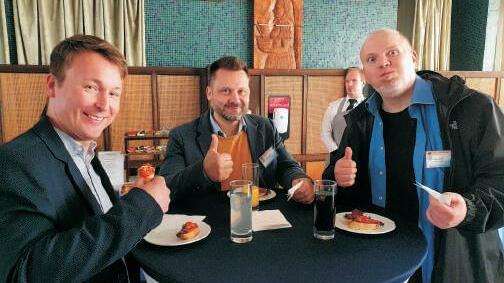
(UVMB, Department and Clinic of Internal Medicine) introduced some functions and features of VIN. Soon it was clear that the modules seen in his lecture represent the tip of an iceberg. In the next two lectures Stijn Niessen “Project no. MEC_SZ 141451 has been (VIN.com) honorary professor in Internal implemented with the support provided by Medicine at the Royal Veterinary the Ministry of Innovation and Technology College talked about the AI-driven of Hungary from the National Research, disease prediction and explained the Development and Innovation Fund, virtual internship system of VIN. financed under the MECENATÚRA The last event of the conference was a MEC_SZ_21 funding scheme.”
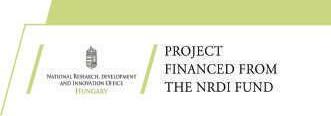
B A L L A G Á S
